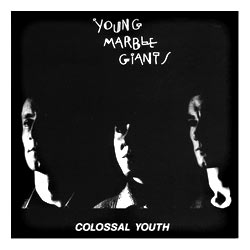Young Marble Giants
Colossal Youth & Collected Works
(Domino)
“You write the gaps as much as you write the music,” quipped Young Marble Giants bassist Philip Moxham. His statement is the post-punk equivalent of Hemingway’s iceberg theory; art is most powerful when stripped to its barest essentials. For Young Marble Giants, a Cardiff, Wales, trio that emerged out of no particular scene in 1978, made one perfect record in 1980, and called it quits in 1981, the barest essentials were subtle guitar, subtle bass, subtle female vocals, and lots of silence as padding.
Indeed, the words subtle and post-punk don’t keep easy company, especially when the genre is now generically defined by its most caustic icon, Mark E. Smith of the Fall. Comparatively, Young Marble Giants made very little noise for 1980. In fact, as writer Douglas Wolk said on Pitchfork, you had to “lean in to hear them.” It was a switching of tactics, an everyone-else-is-loud-so-we’ll-just-play-soft philosophy, that drove YMG to make the music they did. Yet, even though it was preconceived, it sounded perfectly natural.
The first few notes you hear on their lone album, Colossal Youth, are as signature as the ones on “(I Can’t Get No) Satisfaction.” But these are sparse, dry, and trebly. It’s nothing more than a fade-in of guitarist Stuart Moxham (Philip’s brother) muting the chop of his pick by resting the fleshy part of his hand against the strings. Nothing flashy, just a simple beat echoing Sun Records simplicity before Philip enters with a very propulsive but suppressed bass line. When singer Alison Statton (Philip’s girlfriend) steps to the microphone after a few measures, she raises her voice barely above a whisper: “Searching for Mr. Right/Waiting up half the night.” While most singers would aim to express the agony contained in such a lyric, Statton coos as if she’d rather not wake the people in the next room. This can be attributed to the distance she felt from the lyrics, which she didn’t write. They were Stuart’s words, reflecting his own troubled love life, so it’s no wonder she could sound so disinterested (a vocal style later aped by Everything but the Girl and Camera Obscura).
Because of this restraint, you keep waiting for the songs on Colossal Youth to explode, like ticking time bombs. But they never do, even though Stuart’s writing wrangles with some heavy themes, such as the tension between the underground and the mainstream on “Credit in the Straight World” (“I got some credit in the straight world/I lost a leg, I lost an eye”) or a lover’s poor behavior on “Radio Silents” (“Be polite/Tonight/Just for one time”). But as Lou Reed proved, nothing is more punk than sounding bored, and Statton seems to have taken his lesson to heart. Stuart throws out only one scorching solo on the album’s sole rocker, “Include Me Out,” which is still very muffled. By the end of the album, 38 minutes later, you’re hypnotized by their subtle beauty. And that was mostly it for Young Marble Giants.
This particular reissue is packaged with everything else they did: a John Peel session, two singles, and some demos and rehearsal tapes that were later reissued in 2000 as Salad Days. But really, these extras do little to bolster our romantic view of Colossal Youth. If anything, they reassure us that their early breakup was well-timed. The band did something rare in rock ‘n’ roll: got out while it was good. And in this era of poorly conceived reunions, which have shattered plenty of legacies (see: Stooges), let’s hope Young Marble Giants can leave well enough alone. BRIAN J. BARR
D. Charles Speer
Some Forgotten Country
(Sound@One)
Some Forgotten Country opens with picket-fence guitar, Harry Smith banjo, and a bluesman spitting marbles: “Going to Atlanta just to look around….” I’ve heard this stoned baritone before, almost 40 years ago. He’s the willing trucker “smuggling smokes and folks from Mexico,” the strung-out hillbilly “with a needle and a spoon,” the back-alley drunk pleading for “Available Space.” The baritone disappeared around ’72 or so. After that, the American troubadour split in two: the traditionalist and the lysergic freak. Each one has never been anything more than half a man, pumping out a lot of really incomplete music. This is why Some Forgotten Country sounds so needed in 2007. Currently living in New York and calling himself D. Charles Speer, the baritone has returned, bringing the total musician back to life. Culling his backing band from Sunburned Hand of the Man and No-Neck Blues Band, Speer wanders America in both words and sound. “Young and old/North and south/People all know the white guy’s a louse,” he cryptically chews on the hilltop sermon “Stingray Leather.” When Speer falls silent, his rustic unit, augmented with phantom lap steel and Butterfield’s electric axe, ventures where lyrics can’t, painting sparse but sweeping landscapes that stretch from ’60s San Francisco to archaic Appalachia. Who knows how long the baritone will stick around? But it feels damn good to have him back. JUSTIN F. FARRAR




